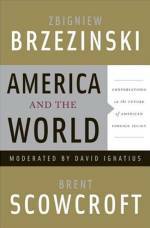Books
How to avoid the next war

If you’re concerned about where Republican fear-mongering on the war on terror might lead us, don’t turn to the Democrats, who when it counted caved in to Bush on the Iraq War (and now mostly echo McCain/Palin’s position on the Middle East). Instead, go to clear-eyed foreign policy realists like Brent Scowcroft and Zbigniew Brzezinski (both former National Security Advisors, under Bush I and Carter, respectively). Scowcroft bravely opposed the Iraq War from the start (despite his friendship with the Bush family), and Brzezinski has been a voice of reason in the post-cold war era (despite his hawkish stance during the Cold War). In their new book, America and the World: Conversations on the Future of American Foreign Policy, they don’t mince words in diagnosing what’s wrong with our post-9/11 foreign policy, as this review in the NY Times makes clear:
Unlike neoconservative ideologues in the current administration, the two former national security advisers say that talks with hostile parties can be a useful tool, and they argue that in the wake of 9/11, the Manichean language employed by President Bush has alienated allies and aggravated resentments in many parts of the world.
They point to the importance of alliances in an increasingly complicated and interconnected world. And they object to what Mr. Scowcroft refers to as the propagation of ‘an environment of fear’ at home, which Mr. Brzezinski says has made Americans ‘more susceptible to demagogy’ and to ‘a fearful paranoia that the outside world is conspiring through its massive terrorist forces to destroy us.’
What makes these discussions between Mr. Brzezinski and Mr. Scowcroft so bracing is their combination of common sense and an ability to place America’s relationship with a particular country in both a historical perspective and a regional context of competing interests and threats. Their book should be required reading not only for the next president elect but also for any voters concerned with the foreign policy issues that will be on the next administration’s plate.”
Since it looks like John McCain and Sarah Palin are even more prone to paranoia, demagogy, and “Manichean” language—reducing every global conflict to a battle between good and evil—than George Bush has been, every voter should be concerned about how the next administration will conduct foreign policy.
By now, I would think Americans are tiring of the pathetic post-mortems that follow each crisis or catastrophe that brings ruin to economies (ours), cities (New Orleans) and countries (Iraq). We need to recognize and stop irrational policies and behaviors before they destroy. The world is too complex, interdependent and dangerous to allow irrationality to trump reason. This new book by Scowcroft and Brzezinski can help remedy that in foreign policy, before we blunder into a catastrophic war.
By AT 09.24.08 01:35PM Not Rated
Angelo, how do you define “neoconservative ideologues,” a term the authors use to describe the Bush administration? I’ve seen and heard this term for years and haven’t a clue as to the definition. My only hint is how and when it’s used and by whom, and my guess is that it means those who support Israel and refuse to negotiate with terrorists, or even label a terrorist as such. Is that correct?
By AT 09.26.08 02:25AM Not Rated
By comparison to the deranged Perles driving Bush Jr’s. policies, not to say the traitorous Boots pushing McCain’s, Brzezinski & Scowcroft certainly *sound* reasonable; but are they?
Brzezinski now rants like a good nationalist Pole about the need to confront Russia, though the only sensible need Americans have - if their interest is but that of their fellow countrymen - is to establish the amicable relations Russia clearly desires: & to do so as a prelude to mothballing the nuclear weapons both countries still quite immorally point at each other’s cities & civilians.
Scowcroft’s bona fides are even more dubious. For all the inane doggerel of Bush Jr.‘s reign, its foundation was established by Bush Sr. & Scowcroft in the astounding decision either to betray Saddam Hussein by encouraging the invasion of Kuwait, or the failure beforehand to make clear to him the consequences of such an invasion.
Remember that Hussein had not only been a CIA-funded US ally for decades, but was such a loyal one that he invaded Iran in 1980 during the hostage crisis - which is to say when he was about the only person in the world still willing to give poor Jimmy Carter a hand.
It is accordingly rather worse than fatuity to pretend the invasion of Kuwait could not have been stopped beforehand, had Mr. Scowcroft & Bush Sr. not wanted instead - whatever it is they did want.
What they got was bin Laden’s interest, the fall of the Trade Center, the Semitic wars, Bush Jr., the apparent bankrupting of the imperial adventure, & of the American people.
So let’s temper enthusiasm for Scowcroft, Bush Sr., & the misnomered ‘realists,’ at least until they explain the odd Red Light they neglected to flash, which is what’s responsible for all that’s followed.
Ps: Brzezinski worked for Carter, not Clinton.
By AT 09.26.08 03:33AM Not Rated
One at a time:
Thanks to Antigon for catching the Clinton/Clinton slipup. On the larger point, obviously Scowcroft and Brzezinski are not ideal, but for now, and for me, they’re the one-eyed men in the land of the blind, men who are credible to those in power, who might be able to influence the people who make decisions. Oen of the reasons they’re credible is that they do come from that camp. I’m not endorsing them personally, just the statements cited. You and I have had these debates before, and I continue to have no interest in sideshows, which is how I would characterize someone like Ron Paul (and in his case, purity on this issue comes with outlandish impractically, even recklessness, on other issues). Like it or not, incremental change is the only kind of change that meets the test of prudence. That’s what I’m interested in.
Chassup: I won’t mince words. This site is with the Church in having a presumption against war. The Neocons have a presumption for war. Jesus didn’t advocate pacifism but neither can you read a presumption for violence into his Gospel.
RickCross: Fearmongering is how I would describe the overall tone of the Republican Party’s foreign policy stance. It’s a great logical leap to say that characterization implies what you say. On the contrary, I agree with Pat Buchanan when he says that Americans are the most kindhearted people in the world. The problem is not what we feel but how we see the world. For whatever reason, our isolation from the world, or our insecurity, Americans have always had a paranoid streak. That’s a discussion in itself. In the meantime, please deal with the substance of the issue, not what you think I’m implying about your morality or your mental health.
By AT 09.26.08 04:13AM Not Rated
Chassup: I think the term “neoconservative ideologues” here refers to those who advance the belief that we should use American military action—rather than creating “stable”, “friendly” dictatorships like Saddam Hussein’s (and Augusto Pinochet’s, etc. et al.)—use it to create “stable”, “friendly” democracies. I take it a true traditional conservative would say that, while we should be prepared to use all necessary force to defend our own national sovereignty, we shouldn’t be interfering and intriguing in foreign governments at all. Whereas those on the left/liberal end of the spectrum are going to be promoting socialist governments here and abroad.
By AT 09.26.08 02:33PM Not Rated
ZARCHNE, Thanks for that. I guess I’m not a neocon, even by Angelos definition because I don’t have a “presumption for violence.” What would you call the guy who sees his classmates being bullied every day on the playground, cowing and crying and handing over lunch money, and finally decides that his own safety and comfort is worth risking and stands up to the bullies? Oh, add to that a peculiar phenomenon in this scenario… when he stands up, those being bullied tell him to sit down lest he make the bullies angry, he stands anyway. What do you call that guy, that’s me. And what do you call those who, while later enjoying lunch, call their champion a warmonger?
Angelo, the term neocon using your definition “presumption for violence” is hyperbole since I am not aware of anybody who thinks war is the only solution to foreign policy issues except some of our enemies. I guess president Tom of Iran, Hamas, Hezbollah, Al-Qaeda, et al, are all neocons by your definition. I’ve been in the propaganda business my entire adult life, I know it when I see it, and neocon is part of the liberal left’s propaganda lexicon.
By AT 09.27.08 05:59PM Not Rated
Angelo said: “Fearmongering is how I would describe the overall tone of the Republican Party’s foreign policy stance. It’s a great logical leap to say that characterization implies what you say.”
According to the Webster’s New Collegiate Dictionary, a fear-monger is one who “deals” or “brokers” in fear, or “who attempts to stir up or spread (fear) that is petty or discreditable.” Therefore, fear-mongering is a vice and the fear-monger is a liar, and arguably, those who believe fearmongers are rather dull-witted, imprudent, or deranged. Thus, I stand by my prior assertion, since it is based upon the accepted definition of the term and reasonable inferences therefrom.
To call George Bush or John McCain or other Republican party leaders fear-mongers is inflammatory. I just wish that you would refrain from using inflammatory language against Catholics and sincere Christians and patriots who disagree with your positions on war and peace. There is plenty of room for discussion and disagreement over these matters that are clearly matters of prudence without resorting to such language.
Peace!








By RickCross AT 09.24.08 01:00PM Not Rated
Angelo, your use of the expression “fear mongering” suggests that all those who oppose your position on the Iraq invasion are in some way morally deficient, or perhaps mentally unstable. This kind of rhetorical flourish is tiresome and counterproductive. Reasonable people can hold different views on the wisdom of the Iraq invasion.